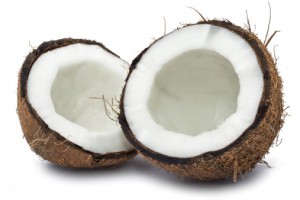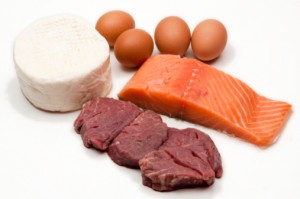8 Myths About Womens Fitness You Should Stop Believing Right Now

When it comes to the best way to work out, there are a lot of beliefs out there that are either outdated or just wrong. Best practices seem to be thrown around as lightly as Donald Trump throws around "facts" (sorry, I couldn't resist that one).
Especially when it comes to workout do's and don'ts for women, it can be easy to get a sound bite of advice stuck in your head that may not be true.
Below are some common myths when it comes to fitness for women:
1. Resistance training will make you bulky.
As a spin instructor, this is the one I hear the most. Many women are afraid to turn up the resistance too much because they're afraid that they'll get big thighs. The same thing goes for lifting weights—women are afraid they'll look bulky and manly if they do too much strength-training.
Actually, the opposite is true. High-intensity strength training makes your muscles stronger, which adds definition and speeds up your metabolism, which means you burn more calories when you're not even working out!
Unless you start taking testosterone supplements and consistently consume way more calories than you burn, it's physically impossible for women to bulk up accidentally. Women have much lower testosterone levels than men, which prevents them from developing large, bulky muscles.
Aside from boosting your metabolism and therefore aiding in weight loss, other benefits of lifting weights include increased mobility, preventing muscle loss, fixing posture, and alleviating back pain.
2. You shouldn't eat right after a workout.
Exercise puts stress on your muscles, joints, and bones and depletes your stores of glycogen, electrolytes, and fluids. After an intense workout, your body needs to repair the damaged muscle tissue and build new tissue. This post-workout healing process is actually when your body is getting stronger, so it's super important to aid this process by eating a snack within 15 minutes to an hour of your workout.
This will give your body what it needs to restore energy levels, recover faster, and build more metabolism-boosting muscle.
Now, this doesn't mean you should go for a huge ice cream cone after every workout. Pick a snack that's under 150 calories and if you've been working out for at least an hour, one that is high in protein (10 to 20 grams) and contains some carbs (30 to 40 grams). Avoid high-calorie sports drinks and energy bars and stick to real food.
Bananas are known as the ideal post-workout snack for a reason—they're an awesome source of carbohydrate and provide electrolytes (potassium) that are lost through sweat. The peanut-butter flavor of Barnana combines the protein from the peanut butter with the goodness of the banana. Greek yogurt is another good source of carbs and protein.
3. Drinking water during a workout will add to water weight.
While it's true that often the first type of weight to get dropped if you're dieting is water weight, water weight does not fluctuate with the amount of water you drink! That's right, the type of water weight that looks like excess weight is actually stored in the layer under the skin, and drinking water is one thing that flushes it out.
Another thing that helps flush it out is electrolytes. Yep, it's back to those bananas and their potassium.
Drinking water during a workout is also important for performance and will help you avoid dehydration, since you're losing water through sweat and breath when you exercise. Water helps your blood transport nutrients and oxygen around your body, which gives you more energy for your workout. It is recommended that you drink 7 to 10 ounces every 10 to 20 minutes of exercise, as well as before and after your workout.
4. You'll lose more tummy fat if you do crunches.
Contrary to popular belief, you cannot target which part of your body loses weight. However, you can speed up your weight loss by strengthening large muscles like your quads and glutes, therefore giving your metabolism a boost. That's why workouts that work those muscles more (like Pilates and spinning) can aid in weight loss.
5. You should work out every day.
If you've committed to a fitness goal and are super-determined to reach it, you may be tempted to work out every day to get it. The more, the better, right? In the case of working out, wrong! Taking one break day a week actually improves results, including strength and weight loss.
6. You can skip the post-workout stretch.
Although studies have come up with mixed results about whether stretching before and after your workout decreases muscle soreness, there are other benefits to stretching afterward that are just as important. Your body is warm after a workout, so stretching at that time can help improve your flexibility and the range of motion in your joints. Better flexibility can improve your performance in physical activities or decrease your risk of injury.
Another benefit of post-workout stretching? The psychological effect. Taking a few minutes to stretch allows you to center yourself and tune in to your body before re-entering your daily life. It gives you a chance to enjoy the accomplishment of what you just achieved.
7. For better results, you just need to pick one thing you like and stick with it.
Although being consistent and diligent with working out is definitely something to be proud of and can produce results, doing the same workout over and over again gets old. Literally. Without spikes in intensity or variations in your workout, your body adapts and you reach a plateau. I know plenty of women who just run or do yoga as their workout for years and wonder why they aren't losing weight or getting stronger. Essentially, their bodies and minds are just bored.
8. The longer your workout, the more results you'll see.
This depends on the type of workout you're doing and what your goals are.
If you're looking to get leaner and stronger, doing shorter high-intensity workouts where you hit 90 to 100 percent of your max intensity will help you get there. If you're starting from a point of a sedentary lifestyle and are just starting to work out, or if you just want to maintain and not necessarily change your body, longer moderate workouts like walking will likely fit your lifestyle and goals better.
When it comes to workout myths, what is right given current research and right for your body may change over time. One overall rule of thumb that I always keep in mind is that variety is the spice of life. If results and change are what you're after, make sure that at least once a week you're getting uncomfortable in your workout—the type where you know you're pushing past your comfort zone and doing something different.
And don't forget to listen to your body and to feed it with good food, water, and deep breaths!
-
Lose 20 Pounds: How to Do It
Can you really lose 20 pounds? Of course, you can. There are so man
-
12 Ways to Stay Active When Its Too Hot to Work Out
V
-
Being a Couch Potato Is More Harmful Than You Think
The idea of couch potatoes tends to conjure up images of overweight, l
-
Dietary Fats And Obesity
Although much attention has been focused on the need to reduce dietary
-
Solid Suggestions That Make Weight Loss Easier
Losing weight or sticking to a diet during the holidays can be a
-
Buy Hoodia Gordonii Plus or else Buy Proactol to get a Fat loss Product
After searching the losing fat marketpla
- DON'T MISS
- 4 Fundamental Principles to Losing Weight
- Top 10 Foods That Help You Lose Weight
- Hypnotist Kent Sayre On Confidence And Weight Loss
- 5 Reasons Why People Fail At Weight Loss
- Goji Juice Scams; How To Reveal Them
- Advice On How To Lessen The Impact Hemorroids Have On Your Life
- How To Improve Your Results With Slimming Pills
- Simple Summer Fat Attack
- Sugar is Killing You
- Water/ Hydration




